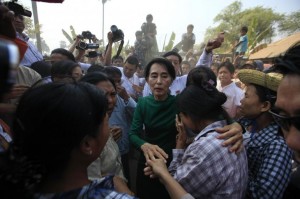Investment at What Cost?
By Burma Partnership • November 11, 2013 The re-engagement of Burma with the global, free market economy has created opportunities, hope and great potential. Yet with this re-engagement come significant pitfalls, human rights abuses and the legitimization of past abuses being two of the more serious. All foreign investment must be scrutinized and held to the highest standards in order to avoid either of the above mentioned dangers. Specifically, business ties to any cronies of the Burma Army or perpetrators of human rights abuses must not be tolerated and land confiscation associated with this increased business engagement must end.
The re-engagement of Burma with the global, free market economy has created opportunities, hope and great potential. Yet with this re-engagement come significant pitfalls, human rights abuses and the legitimization of past abuses being two of the more serious. All foreign investment must be scrutinized and held to the highest standards in order to avoid either of the above mentioned dangers. Specifically, business ties to any cronies of the Burma Army or perpetrators of human rights abuses must not be tolerated and land confiscation associated with this increased business engagement must end.
On 7 November, 37 civil society organizations sent a letter to President Barack Obama asking him to update the US Specially Designated Nationals list for Burma. The list is a US Treasury Department list of individuals and companies barred from having financial or business ties to the United States. These individual and companies were barred due to their ties to the military regime, serious human rights abuses, corruption and the selling of weapons to North Korea. This list has remained basically unchanged since 2009; this is despite the ongoing corruption in the country and the very serious human rights violations that have occurred. The US itself acknowledges that the list is out of date, as evidenced by diplomatic cables leaked in 2009 where the US embassy in Rangoon noted that “many of the real perpetrators of human rights abuses or those who provide significant support to the regime are not yet targeted.” An updating of the list and a systematic way of adding and removing names are of immediate importance. To date the US government has been more concerned with establishing economic ties and a revised list could cause complications for US businesses. This is a sad state of affairs when economic interests trump basic human rights.
One of the most frequent human rights violations that this list would target and one which is increasingly occurring in Burma is land confiscation. Burma Partnership has released a briefer highlighting the seriousness of this on-going problem. The increase in foreign investment, the liberalization of the economy, and lack of rule of law generally, including both appropriate legislation and an independent judiciary, have resulted in land confiscation on an endemic scale. The government of Burma has responded to this growing problem with inadequate laws and is currently viewed more as an obstacle than a part of the solution.
In response to Oxfam’s campaign against land confiscation that is driven by food and drink companies, Coca Cola has committed to a “zero tolerance” policy on land confiscation throughout its supply chain. This is welcome news after Coca Cola has re-entered Burma for the first time since 1962. The company has pledged to:
- “Commit” to zero tolerance for land grabs
- “Know and Show” risks related to land rights and land conflicts in their supply chains
- Advocate for governments and others in the food industry to tackle land grabbing and to support responsible agriculture investment.
This is a positive development but it highlights the glaring inadequacies regarding land confiscation in Burma generally. This is an individual commitment by a single company and has come after significant pressure by an international advocacy organization. The fact that there isn’t an across the board commitment to a zero tolerance approach to land confiscation by all companies operating in Burma is unacceptable and the fact that in their current state, Burma’s domestic laws regarding land confiscation are unable to adequately deal with this violation is equally troubling.
Economic engagement with Burma must come with a strong emphasis on which actors companies are engaging with and what effect this engagement has. Business done with past and present human rights violators, with corrupt officials, with those that have ties to one of the most oppressive governments of the past 60 years is indefensible. Business that results in land confiscation from some of the most oppressed people cannot be supported. Western economic engagement will continue, the question that needs to be asked is with whom and at what cost?
Tags: Burma Partnership, Investment, Land Confiscation, SanctionsThis post is in: Blog
Related PostsBurma Partnership Celebrates Continuing Regional Solidarity for Burma and Embraces the Work Ahead for Progressive Voice
Burma Army Displays Blatant Disregard for 21st Century Panglong Peace Process
Ann Din Coal Power Plant: Local Movement and Action to Preserve and Protect Natural Resources and Land: Mon IDP Report Case Study #4
Latest Human Rights Abuse Case Demonstrates Urgent Need to Reform the Myanmar National Human Rights Commission
Human Rights Far From Guaranteed as US Sanctions on Burma Are Removed









 All posts
All posts